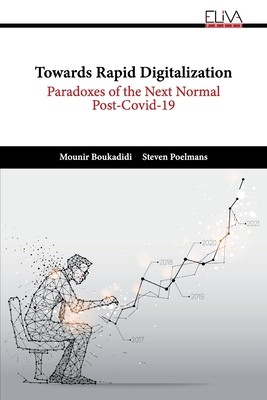
- We will send in 10–14 business days.
- Author: Steven Poelmans
- Publisher: Eliva Press
- ISBN-10: 1636483879
- ISBN-13: 9781636483870
- Format: 15.2 x 22.9 x 0.3 cm, softcover
- Language: English
- SAVE -10% with code: EXTRA
Reviews
Description
Covid-19 caused a sudden disruption that pushed firms to urge transformation and digitalize to adapt to the new unprecedented societal changes. Decision makers were facing paradoxes to sustain their businesses, under stress, fear, and urgency. One way to achieve resilience is the adoption of cloud technology, which decision makers used to question. In fact, covid-19 pushed firms to reconsider the way they acquire and use technology. Perceived as a choice for rapid digitalization, cloud computing puts decision makers in a paradoxical situation where acceleration conflicts with data sovereignty. Based on an inductive qualitative research, this paper answers the question of what decision makers do to allow a mindset shift from a traditional way of perceiving technology, to a new concept of technology as a service that is shaped by fear and non-trust. We try to identify what factors shape this mindset shift and how covid-19 influence them. Semi-structured interviews have been used to interview 21 senior executives spread in 15 countries. Themes analysis and analytic hierarchy process (AHP) methodology have been used to analyze data, and finally we propose a conceptual model representing the paradoxes under scrutiny. The research is relevant because we still don't know much about how the concepts of data and technology relate to the challenges imposed by the pandemic, especially in a decision-making context that is characterized by fear and urgency. This paper contributes in shaping academic and practical understanding of the implications on firms' survival, and economic recovery post-covid-19.
EXTRA 10 % discount with code: EXTRA
The promotion ends in 19d.15:30:16
The discount code is valid when purchasing from 10 €. Discounts do not stack.
- Author: Steven Poelmans
- Publisher: Eliva Press
- ISBN-10: 1636483879
- ISBN-13: 9781636483870
- Format: 15.2 x 22.9 x 0.3 cm, softcover
- Language: English English
Covid-19 caused a sudden disruption that pushed firms to urge transformation and digitalize to adapt to the new unprecedented societal changes. Decision makers were facing paradoxes to sustain their businesses, under stress, fear, and urgency. One way to achieve resilience is the adoption of cloud technology, which decision makers used to question. In fact, covid-19 pushed firms to reconsider the way they acquire and use technology. Perceived as a choice for rapid digitalization, cloud computing puts decision makers in a paradoxical situation where acceleration conflicts with data sovereignty. Based on an inductive qualitative research, this paper answers the question of what decision makers do to allow a mindset shift from a traditional way of perceiving technology, to a new concept of technology as a service that is shaped by fear and non-trust. We try to identify what factors shape this mindset shift and how covid-19 influence them. Semi-structured interviews have been used to interview 21 senior executives spread in 15 countries. Themes analysis and analytic hierarchy process (AHP) methodology have been used to analyze data, and finally we propose a conceptual model representing the paradoxes under scrutiny. The research is relevant because we still don't know much about how the concepts of data and technology relate to the challenges imposed by the pandemic, especially in a decision-making context that is characterized by fear and urgency. This paper contributes in shaping academic and practical understanding of the implications on firms' survival, and economic recovery post-covid-19.


Reviews